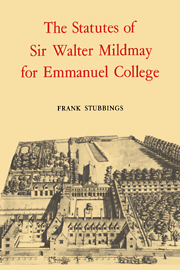Book contents
- Frontmatter
- Contents
- List of plates
- Preface
- Abbreviations
- Introduction
- The historical background
- The manuscripts
- The Statutes of Sir Walter Mildmay, Knight, Chancellor of the Exchequer and one of Her Majesty's Privy Council, authorised by him for the government of Emmanuel College, founded by him
- The College orders of 1588
- Statuta D. Gualtheri Mildmaii Militis Cancellarii Scaccarii et Regineae Maiestati a consiliis: quae pro administratione Collegii Emmanuelis ab eo fundati sancivit
- Statutum de Camera Consanguineis fundatoris reservand
- De mora sociorum in Collegio, et de gradu Doctoratus in sacra Theologia Susripiendo
- Index
- Plate section
Introduction
Published online by Cambridge University Press: 03 March 2010
- Frontmatter
- Contents
- List of plates
- Preface
- Abbreviations
- Introduction
- The historical background
- The manuscripts
- The Statutes of Sir Walter Mildmay, Knight, Chancellor of the Exchequer and one of Her Majesty's Privy Council, authorised by him for the government of Emmanuel College, founded by him
- The College orders of 1588
- Statuta D. Gualtheri Mildmaii Militis Cancellarii Scaccarii et Regineae Maiestati a consiliis: quae pro administratione Collegii Emmanuelis ab eo fundati sancivit
- Statutum de Camera Consanguineis fundatoris reservand
- De mora sociorum in Collegio, et de gradu Doctoratus in sacra Theologia Susripiendo
- Index
- Plate section
Summary
A CHARTER of Queen Elizabeth I dated n January in the twentyseventh year of her reign (1583/4), which is the prime treasure among the Emmanuel College Archives, empowers Sir Walter Mildmay, Knight, Chancellor of the Exchequer and one of Her Majesty's Privy Council, to establish a ‘College of sacred theology, sciences, philosophy, and good arts’ consisting of a Master and thirty Fellows and Scholars (graduate and undergraduate), more or less. The College is to be a perpetual body corporate, with the usual powers of owning property, and of suing and being sued in the courts of the realm; and the Founder (or after him his heirs or assigns) is authorised to make statutes for the good and wholesome governance and regulation of the College. It is the statutes made by Sir Walter under this charter that are here presented in full in an English translation. As a picture of a living society a body of rules might well be thought no more than dry bones; but Mildmay's statutes have a deal more flesh on them than their modern counterparts. He is not afraid to explain his motives, and that not only in the preface, which sets the tone of the College as a seminary of Puritan preachers. Nor is the text cast all in large and general words. In these statutes we read not only what manner of men the Founder wanted as Master and Fellows and Scholars, but also what faults and vices they were to avoid; not only how their election was to be conducted but what possible malpractices must be guarded against.
- Type
- Chapter
- Information
- The Statutes of Sir Walter Mildmay , pp. 1 - 2Publisher: Cambridge University PressPrint publication year: 1983



